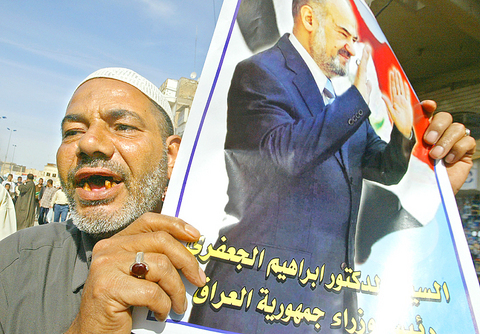Pressure mounted yesterday on Iraqi Prime Minister Ibrahim al-Jaafari to stand down, as Kurdish and some Shiite officials said Iraq's new parliament would be ready to convene within days.
A recent surge of sectarian killings has complicated already snarled negotiations about a new government, which has prevented parliament from meeting since it was elected on Dec. 15. The vote was certified last month.
Early yesterday, police reported commandos from the Shiite-led interior ministry stormed a Sunni mosque in west Baghdad, killing three people and injuring seven in a 25-minute gunbattle. The reason for the clash was not immediately known.

PHOTO: AFP
Interior Ministry Major Falah al-Mohamadawi denied commandos were involved.
"There is no indication in our records that interior ministry's police commandos carried out the raid. The claims are not true," he said.
US officials say a coalition government that includes all Iraq's ethnic and religious communities is essential for stabilizing the country and allowing US and other foreign forces to start pulling out in the summer.
As the largest bloc in parliament, the Shiite United Iraqi Alliance gets the first chance to form a government, but it does not have sufficient seats to do so on its own. Sunni, Kurdish and some secular parties are now pressing the Shiite Alliance to withdraw their nomination of al-Jaafari for a new term. He has served as prime minister in the transitional government that took power in April.
The Sunni Arab minority blames the prime minister for failing to control Shiite militiamen who attacked Sunni mosques and clerics after the Feb. 22 bombing of a revered Shiite shrine in the central city of Samarra. More than 500 people were killed in the violence that followed, according to police and hospital accounts.
Khalaf al-Olayan, a leader of the main Sunni bloc, said Iraq has gone from "bad to worse."
"Al-Jaafari's government failed to solve the chaos that followed the Samarra explosions and did not take any measures to solve the security crisis that could have pushed the country into civil war," he said in comments posted on the Sunni Iraqi Accordance Front Web site.
Kurds are angry because they believe al-Jaafari is holding up resolution of their claims to control of the oil-rich city of Kirkuk.
``If al-Jaafari tries to form a government, he will not get any kind of cooperation,'' said Mahmoud Othman, a leading figure in parliament's Kurdish bloc.
President Jalal Talabani, also a Kurd, entered the fray on Saturday, saying the Shiite Alliance should choose another candidate for the sake of consensus.
"I want to be clear, it is not against Dr. al-Jaafari as a person. He has been my friend for 25 years," Talabani told reporters.
The Alliance itself is divided about who should be prime minister: Al-Jaafari won the nomination by a single vote at a Feb. 12 Shiite caucus. Some members are troubled by al-Jaafari's ties to radical young cleric Moqtada al-Sadr, whose support was key in defeating Vice President Adil Abdul-Mahdi, the choice of powerful Shiite leader Abdul-Aziz al-Hakim.
Al-Sadr and al-Hakim, who both have powerful militias behind them, are frequently at odds politically.

PRECARIOUS RELATIONS: Commentators in Saudi Arabia accuse the UAE of growing too bold, backing forces at odds with Saudi interests in various conflicts A Saudi Arabian media campaign targeting the United Arab Emirates (UAE) has deepened the Gulf’s worst row in years, stoking fears of a damaging fall-out in the financial heart of the Middle East. Fiery accusations of rights abuses and betrayal have circulated for weeks in state-run and social media after a brief conflict in Yemen, where Saudi airstrikes quelled an offensive by UAE-backed separatists. The United Arab Emirates is “investing in chaos and supporting secessionists” from Libya to Yemen and the Horn of Africa, Saudi Arabia’s al-Ekhbariya TV charged in a report this week. Such invective has been unheard of

‘TERRORIST ATTACK’: The convoy of Brigadier General Hamdi Shukri resulted in the ‘martyrdom of five of our armed forces,’ the Presidential Leadership Council said A blast targeting the convoy of a Saudi Arabian-backed armed group killed five in Yemen’s southern city of Aden and injured the commander of the government-allied unit, officials said on Wednesday. “The treacherous terrorist attack targeting the convoy of Brigadier General Hamdi Shukri, commander of the Second Giants Brigade, resulted in the martyrdom of five of our armed forces heroes and the injury of three others,” Yemen’s Saudi Arabia-backed Presidential Leadership Council said in a statement published by Yemeni news agency Saba. A security source told reporters that a car bomb on the side of the road in the Ja’awla area in

US President Donald Trump on Saturday warned Canada that if it concludes a trade deal with China, he would impose a 100 percent tariff on all goods coming over the border. Relations between the US and its northern neighbor have been rocky since Trump returned to the White House a year ago, with spats over trade and Canadian Prime Minister Mark Carney decrying a “rupture” in the US-led global order. During a visit to Beijing earlier this month, Carney hailed a “new strategic partnership” with China that resulted in a “preliminary, but landmark trade agreement” to reduce tariffs — but

SCAM CLAMPDOWN: About 130 South Korean scam suspects have been sent home since October last year, and 60 more are still waiting for repatriation Dozens of South Koreans allegedly involved in online scams in Cambodia were yesterday returned to South Korea to face investigations in what was the largest group repatriation of Korean criminal suspects from abroad. The 73 South Korean suspects allegedly scammed fellow Koreans out of 48.6 billion won (US$33 million), South Korea said. Upon arrival in South Korea’s Incheon International Airport aboard a chartered plane, the suspects — 65 men and eight women — were sent to police stations. Local TV footage showed the suspects, in handcuffs and wearing masks, being escorted by police officers and boarding buses. They were among about 260 South